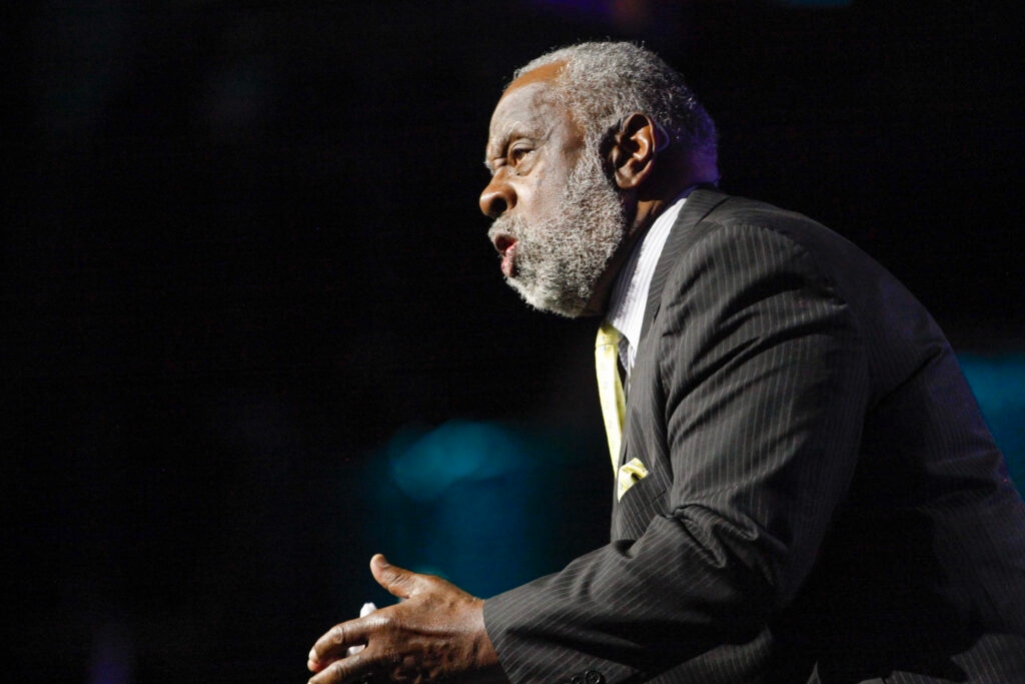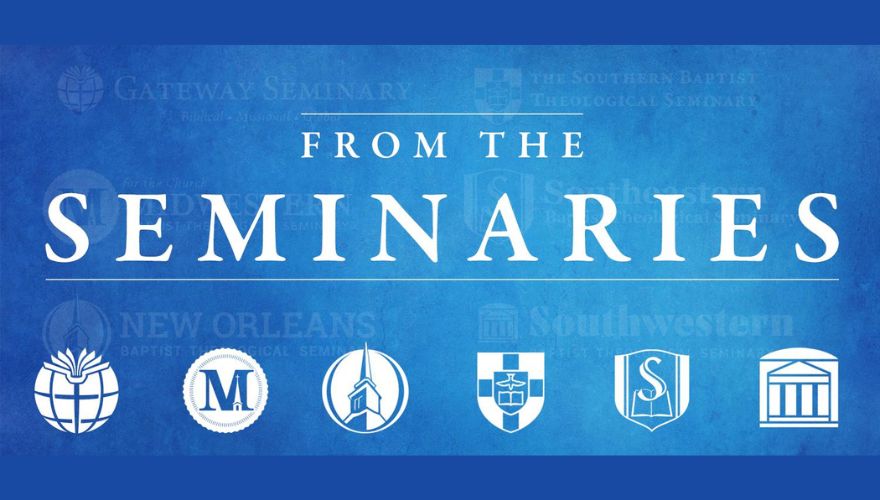
Robert Smith Jr., professor of preaching at Beeson Divinity School, called Acts 8 “a miniaturized fulfillment of the Great Commission” that shows the gospel’s expansion from Jerusalem, Judea and Samaria to the uttermost parts of the earth. Smith preached at the 2024 SBC Pastors' Conference in Indianapolis.
INDIANAPOLIS (BP) — Faithfulness in prayer, to the next generation, under pressure and to families were among the sermon topics during the Southern Baptist Convention (SBC) Pastors’ Conference June 10 at the Indiana Convention Center in Indianapolis.
Benny Wong
Early in his ministry, Benny Wong, Chinese-English bilingual director at Gateway Seminary, failed to intercede for his flock as he should have, Wong admitted in the opening sermon Monday.
“Since then, I’ve been asking God to help me to grow in the school of prayer,” Wong said.
Wong drew from Moses’ example in Exodus 32:7-14 and in Deuteronomy 9:8-29 to show that faithful intercessors go to God in prayer as soon as they hear of a need. Moses interceded for the children of Israel immediately when God told him of their rebellion and before he saw the golden calf with his own eyes, Wong said.
“Don’t delay praying though you have not seen a real case with your own eyes,” Wong said, urging pastors not to wait to pray until their youth drift from the faith or fall into addiction.
Faithful intercessors must pray tirelessly, Wong said. Moses prayed tirelessly and prayed for 40 days and nights both at Mt. Sinai and at Kadesh-Barnea, Wong said.
He pointed also to Augustine, “one of the greatest thinkers” in the faith, whose mother prayed 17 years for his conversion as he lived in immorality and rebellion.
A faithful intercessor must also testify to God’s answers to prayer which God can use to motivate others, Wong said. After he told another church how God had answered his congregation’s fervent prayers, a deacon repented of failing to pray and recommitted to intercessory prayer.
Wong concluded, “I encourage all of you to be faithful not only in teaching of God’s Word. Be faithful to the ministry of prayer. … May we take intercessory prayer seriously.”
James Noble
“Be faithful or be forgotten,” James Noble, pastor of Kingdom Community Church in Anderson, South Carolina, and vice president for diversity, community and inclusion at Anderson University, told pastors, imagining a modern-day letter from the apostle John similar to Revelation.
“You have gone a long, long way in material advances, but, America, I am wondering as I look at you from a distance whether you have gone as far in the spiritual realm,” Noble imagined John warning.
Noble emphasized the need for multiethnic churches reflecting the diversity of heaven, and he urged that pastors work toward holiness in the church.
“The church was made for the world, but when the world gets into the church, we have a dangerous situation,” Noble said. “I hear that right has become wrong, and wrong has become right. Do not give in to the evil pressures of your day.”
Nothing compares to the Word of God, Noble said, and faithfulness requires preaching it.
“Don’t quit. Don’t lighten up. Don’t shut up. Don’t back up until we’re all caught up to meet the Lord in the air,” Noble said.
Because the Bible is the norm of all norms, it cannot be normed by anything, he said. “In other words, the Bible norms us, not vice versa. The danger is when you allow culture to norm you.”
Regarding the office of pastor, Noble said believers should “allow the Bible to norm us.”
Shane Pruitt
Shane Pruitt, national Next Gen director for the North American Mission Board (NAMB), said the solution for reaching today’s generation of young people is simple: “Stick to what has worked for 2,000 years. Stick to the Bible.”
Silence is not an option for believers, Pruitt said. In a secular culture that itself preaches, makes disciples and has evangelists, the church cannot remain silent, Pruitt said, pointing to Paul’s clear message of the gospel on Mars Hill in Acts 17.
While today’s culture looks to self for happiness and fulfillment, depression and mental health issues are rising, Pruitt said. The sinful self is the problem.
“If self is the problem, self can’t be the solution,” Pruitt said. “We need Jesus.”
The gospel still works, Pruitt said. Young people are searching for answers and recognize that “they’re broken and the world is broken,” Pruitt said. He tells them they are looking for someone rather than something, and that Jesus is who they need.
The mission is still clear, Pruitt said, emphasizing that every young person who confesses faith in Jesus is part of the church and has the same Great Commission responsibilities as older believers.
Pruitt shared stories of young believers standing up for truth, sharing and living out the gospel and standing strong for Christ despite the cost in friendship and acceptance by others.
“They can handle it,” Pruitt said of today’s generation’s ability to process biblical truth.
“They are not the future of the church,” Pruitt said. “They are the church right now.”
Adam Dooley
Regarding faithfulness under pressure, Adam Dooley, pastor of Englewood Baptist Church in Jackson, Tennessee, said pastors must rest in the manifest presence of God, knowing that it is impossible to endure if they don’t surrender to Him.
From Exodus 33, Dooley said churches must abandon dead religion.
“It is so easy for ministry to become business as usual to us,” Dooley said. “Far too often, we’re content to do the work of God though the presence of God has long been absent. … Is it possible that many of the pressures that we feel in ministry are the direct result of being religious professionals who look to God for His power but have no real interest in His Person?”
Churches must be led by the Spirit, Dooley said.
“I’m just a man. There’s nothing special about me. I am not the secret to our success. My knowledge is limited, my wisdom is insufficient to guide God’s people and my plans fall short of God’s glory. I can’t lead the church and neither can you,” Dooley said. “But God promises to lead His church by His Spirit.”
Churches must be distinct from the world, Dooley said.
“So much of what we offer people, frankly, can be found in other places, and if we’re honest, with a lot better quality,” Dooley said. “… What makes the church distinct is God.”
Robert Smith Jr.
Robert Smith Jr., professor of preaching at Beeson Divinity School, called Acts 8 “a miniaturized fulfillment of the Great Commission” that shows the gospel’s expansion from Jerusalem, Judea and Samaria to the uttermost parts of the earth.
The church began in Jerusalem “but was not restricted to Jerusalem,” Smith said. God used Saul’s persecution of the church, before his conversion, to scatter the seeds of the gospel and fulfill the Great Commission, Smith said.
Smith emphasized God’s use of adversity while noting the change in Paul from Acts 8 to Acts 9.
“In chapter 8, Paul is giving orders; in chapter 9, he’s taking orders from the Lord … in chapter 8, he’s the church’s number one enemy; in chapter 9, he’s the church’s number one defender … It is adversity that causes the church to grow,” Smith said.
Smith continued comparing Acts 8 to Matthew 28:19-20 by pointing out that believers fled Jerusalem for other parts of Judea and then Samaria, sharing the gospel as they went. Philip found himself explaining Scripture to an Ethiopian eunuch on the desert road to Gaza, a place that fits “the uttermost parts of the earth,” Smith said.
Afterwards, Philip was sent on to Azotus, spreading the gospel further, rather than returning him to his “successful ministry” in Samaria, Smith said. “God is the only one I know who can add by subtraction,” Smith said.
Smith concluded, “I’m grateful for a God who’s not concerned just for the neighborhood, but for the nations.”
Jimmy Scroggins
The qualifications for pastors found in 1 Timothy 3:1-7 emphasize marriage and parenting, Jimmy Scroggins, pastor of Family Church in West Palm Beach, Florida, said, but pastors’ families should not feel pressure to be perfect.
“What the church needs to see is not you casting forth an image of perfection that’s not even real and not even true and not even accessible. What the church needs to see is you and your wife loving each other, fighting for it, sticking together, forgiving each other,” Scroggins said.
The passage says a pastor should manage his household well. “That kind of suggests that in the pastor’s family there might be some things that have to be managed,” Scroggins said.
In a world of gender confusion and more, churches should realize fathers are mad about what threatens their children, Scroggins said.
“Dads in our churches need us to call them up and train them to fight. Churches that teach dads to fight for their children will have a reason to exist. Churches that don’t teach dads how to fight for their children, I think, are likely to disappear.”
Churches need to go all in on marriage, teaching young adults to marry earlier than today’s average; they need to go all in on kids, encouraging couples to have more children; and they need to start schools to train up children to combat the culture, Scroggins said.
Jack Graham
In a day when more pastors are “stepping down from ministry than stepping into it,” according to a Wall Street Journal article, character is crucial, said Jack Graham, pastor of Prestonwood Baptist Church in Plano, Texas.
“I can’t think of a more important subject for us right now than this subject of character and integrity,” Graham said.
Graham noted 1 Timothy 4:16 where Paul cautioned Timothy to “keep close watch on yourself and your doctrine” and said that belief and behavior must go hand in hand for the pastor who wants to please God.
Graham defined character as “Christ-likeness,” a godliness that is authentic, blameless and strong in the midst of storms. “Character is who we are before God and God alone.”
Adversity refines character, Graham said, and he urged pastors experiencing disappointment not to quit. Perseverance means “to serve with triumphant joy” because believers know their “labor in the Lord is not in vain,” Graham said.
Character must be aligned with commitment, Graham concluded. Acknowledging that some listeners were “flat out tired,” he pointed to Isaiah 40:31 and its promise of strength for those who wait on the Lord.
“The greatest call in life is the call to serve Jesus,” Graham said. “You are called of God. The Spirit of Christ lives in you.”
Steve Gaines
Steve Gaines, pastor of Bellevue Baptist Church in Memphis, Tenn., used the seven statements of Jesus on the cross to preach on being faithful to the cross. The message of the cross is a message of forgiveness, Gaines said.
“Has someone hurt you? Forgive them even if they don’t ask for forgiveness. Forgiveness sets you free, and you need to be free indeed,” Gaines said.
The message of the cross is a message of salvation, he said, pointing to the thief on the cross. “All he could do was cry out. Praise God, when you cry out, Jesus will hear you,” Gaines said.
The message of the cross is a message of provision, Gaines said, noting that Jesus cared for His mother. It’s also a message of separation as Jesus was forsaken by God on the cross on behalf of sinners.
“Aren’t you glad that He was separated momentarily so that we won’t have to be separated from God eternally?” Gaines said.
A message of humanity was present at the cross when Jesus expressed thirst. “The Lord wants you to help Him sometimes. … Jesus wants you to help by sharing the gospel with lost people. Jesus wants you to share a biblical sermon on Sunday morning,” Gaines said.
The cross was a message of completion when Jesus won the battle, and it was a message of commitment when He gave His life as an offering, Gaines said, sharing the encouragement he’s found in Christ through his own recent battle with cancer.
Stephen Rummage, 2024 SBC Pastors’ Conference president then led the crowd in a prayer for Gaines.


